
Sigefrith bent over the scrap of parchment, sketching in a tower that would be high enough to see both down into the valley and out onto the rolling country on the other side of the hills. From the location of the old fort, it wouldn’t be possible to see his castle or to see any of Bernwald lands at all, but he thought Nothelm should be visible. And certainly from that fort one would be able to see the river and the narrow lakes, and across the valley to the peak of Thorhold on the other side.
It was an excellent location for a fort, blocking the only access to the valley from the east. Theobald’s ancestors had known what they were about. But modern castles of stone had scarcely been dreamt of at that time, a century or more ago. Sigefrith would build the fort into a castle that would put the Normans to shame.
He dropped his quill and picked up his cup. His hands were trembling – he would just have a sip to steady himself.

The days were growing too short. It was a bother working by candlelight, but the evening was the only time when he could work properly – after supper, when he had a belly full of food, and a head full of wine, and had spent an hour with his children surrounding him and with his wife in the same room, too busy with eating and helping the children eat to snap at him. He almost felt something like contentment at this hour.
But the feeling faded rapidly. He wished Cenwulf still came in the evenings to toast his feet by the fire and talk over the plans for the coming days, or else reminisce over days long past. But Cenwulf was at home, trying to feed enough of his strength into his wife to keep her and the baby alive, at least until the baby could safely come. He knew Cenwulf had little hope for Colburga.
It didn’t seem fair that a loving wife such as Colburga should be taken from a good man like Cenwulf, while his Maud, who rightfully despised his miserable self, should prosper. But if the Lord or the devil should ask him whether he would be willing to sacrifice Maud and save Colburga, he would yet refuse. He wondered whether that made him more still despicable.
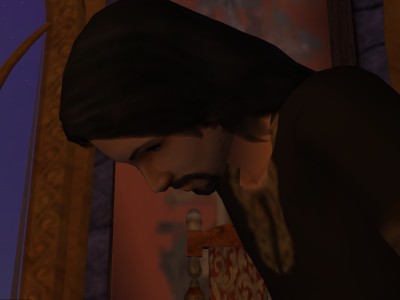
A servant knocked.
“What now?” Sigefrith barked.
“There is a messenger here from Ireland for Your Majesty,” the man said.
“Well? Bring me the letter,” he snapped without looking around.
“Your Majesty, it is a messenger, not a letter.”
“So show him up!”
The man hesitated. “Your Majesty might wish to meet him in the hall.”
“Does the King go to the messenger or does the messenger come to the King?” Sigefrith roared. “Are you all idiots that I need to tell you how to do your duty?”
The servant bowed himself out without another word.
Sigefrith scowled and refilled his cup. They were unbearable. How he missed his father’s steward! That man had known how to keep the servants in line.
He drank down the wine and then picked up his quill again. Perhaps he would add another tower on the other side and connect them with a mighty gate. But it would be easier if his hand didn’t shake so! He must have been more tired than he thought.
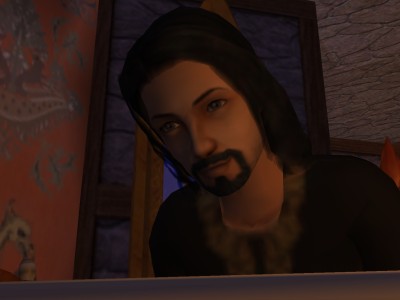
There came another knock at the door. Ah, yes, the messenger. He had already forgotten that in his concentration on his drawing.
“Enter!” he said without looking up.
He couldn’t imagine why Godwine and Magnus would be sending messages to him. They usually wrote to their cousin Matilda. If they thought he was going to send them troops for another ill-starred raid in Wales, they could keep on thinking. They should have sent help when Morcar and the rest of them were at Ely, or at least to Edgar when they had had the support of the Scots King. They could rot in Ireland for all he cared now.
He heard the messenger come in and close the door softly, but the man apparently stood waiting for him to – what? Rise and welcome him? Was he a King or was he not?
“Well, what?” he snapped, still sketching his tower.
“The sons of Harold send greetings to this son of a serpent,” growled an eerily familiar voice.
Sigefrith dropped the quill and closed his eyes.
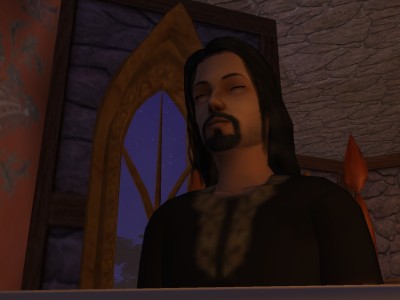
Good God, he had had too much to drink if he was hearing… what he thought he just heard. Egelric was right – he was killing himself.
He had once known a man for whom the phrase “son of a serpent” could serve as dire insult, term of endearment, oath, curse, jest, and jubilation. He was a cousin on his mother’s side, and had been raised in his father’s court. Moreover, he was the first man that the eleven-year-old Lord Hwala had knighted, and Sir Leofric had followed his young lord through all the years and all the journeys and all the battles that followed.
Until Hastings. He had seen that man fall in the first rain of arrows from the Norman bows. Nearly eight years before! He had left those days so far behind.
Either that, or it was Alred making an uncharacteristically unfunny joke. Sigefrith’s eyes snapped open. Whoever had had the idea, he would pay for his insolence.
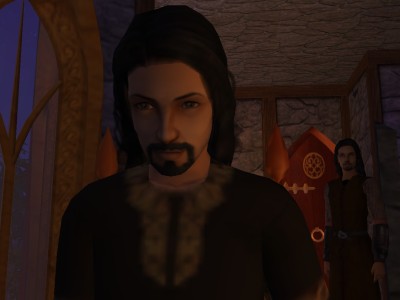
“Sigefrith?” the voice asked hesitantly, as if he feared he had been mistaken. God, it was the same voice!
“I shall kill you, whomever you are, if this is some kind of joke,” Sigefrith said, taking out his dagger and laying it on the table.
The man laughed. “It’s the finest joke I ever played. Look at you with your knife, you runt!”
Sigefrith rose and turned to the man, trembling in his whole body now.
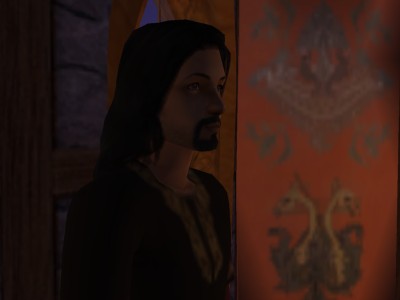
“I have seen things here I would not have believed possible ten years ago. I may also have had far, far too much to drink tonight. What are you?”
“Sigefrith,” the man said gently. “You look like hell. I didn’t intend to frighten you. I’m only my own self, just as you see me.” He bowed and opened his arms with a flourish, and Sigefrith fell into them with a sob.
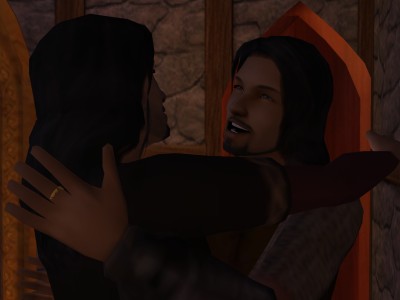
“Now, now, young man,” he laughed. “I thought you would be happy to see me.”
“Oh, but Leofric, I saw you die!” Sigefrith whispered.
“You left me for dead, you meant!”
“Never! You had an arrow right through the heart!”
“I have the scar to prove it. But my old reptilian heart is so hard and leathery it just glanced right off.”
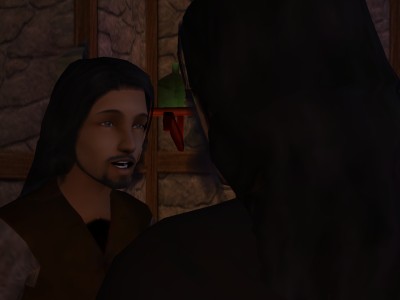
“It’s you! It’s you!” Sigefrith laughed. “By God! What happened to you? Where have you been?”
“That will take some telling! And I shall do it with a nice cup of that wine I see over there, and my feet up on the hearth of the fire I saw in that great hall of yours, King Sigefrith. You have quite a tale to tell as well, I see.”
“Have you been in Ireland all this time?”
“Not at all! The Normans sold the lot of us survivors as slaves to a crew of Norsemen, who took us around by ocean to sell us again to the Moors. I spent years there in the desert, building their cities and mosques and palaces, and occasionally fighting their wars, until one of them figured out I spoke and wrote quite a few languages – I thank your father for that! – and I was sent off to translate correspondence for a chief. And I would be there still if not for my little wife – ”
“Eadgith!” Sigefrith cried eagerly. “Is she with you?”

“Eadgith?” Leofric murmured. “Does she live?”
Sigefrith’s face fell. “I don’t know. I haven’t heard. We all thought you dead.”
“Ah, well,” Leofric said softly. “I meant my little Moor – the daughter of my master. I married her in Denmark, you know. By Danish law she is my wife, whether nor not…”
“Denmark?”
Leofric shook his head. “Allow me to finish. My little Leila helped me to escape. We got across the water to Italy, up to Rome, then across the mountains into Saxony, and finally reached Denmark – there are a few of our friends there, Sigefrith. I had thought to find you. But by that time little Leila was – well, I had to marry her. I didn’t think of Eadgith. Surely she has forgotten me? Married again?”
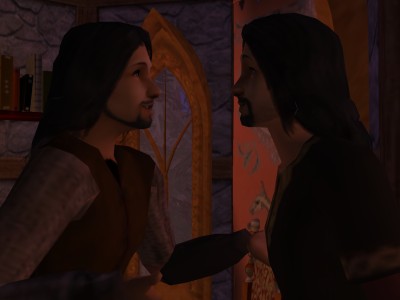
“I don’t know. I haven’t heard.”
“My children?”
“I don’t know. I’m sorry.”
“Well,” Leofric said, putting that thought aside, “I have another son now, little Cedric. He’s down in the hall with his mother.”
“And I have two sons and two daughters and the most beautiful wife you have ever seen!” Sigefrith laughed. “By God, it will take us forty days and forty nights of talking to get all of our tales told!”

“This young runt with sons and daughters like some old bearded patriarch! I shan’t believe it till I see it!”
“And, Leofric, Cenwulf is here, and Alred is here, and Matilda and Colburga!”
“It’s like coming home! Thank God for Matilda – I shouldn’t have found you if not for her.”
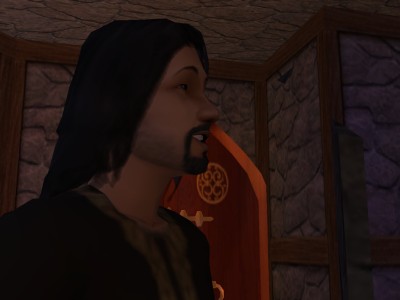
“How so?”
“I went to Ireland when I learned Harold’s sons were there. Swein needed a messenger anyway. And I found them preparing to leave for Denmark themselves, but I learned they were looking around for a messenger to tell their cousin Matilda they were leaving. I humbly proposed my services, and learned thereby that not only did Matilda live, but she was in hiding with a certain Lord Hwala, just across the Irish Sea.”
“You found me at last!”
“Now, care to tell me how I come to find you in a fine castle, surrounded by people who consistently refer to you as His Majesty?”
Sigefrith laughed. “Welcome to my tiny kingdom! It didn’t belong to anyone else, so I claimed it. I even made Alred a Duke and Cenwulf an Earl!”
“I shall not be my lording and your gracing those two ruffians!”
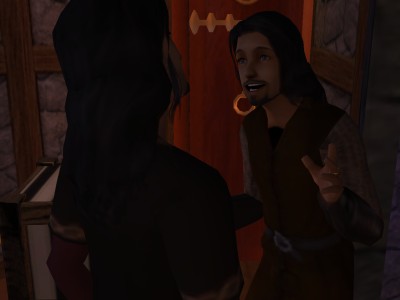
“I suppose it was a joke at first, or a juvenile act of defiance. But it’s become real, Leofric. Did you see this valley by daylight? It’s real. I mean to stay here.”
“What does William say to that?”
“I didn’t ask his permission! I am king here, and have no other kings before me.”
“You’re mad!” Leofric said, but he laughed.

“Seven years so far, Leofric. And the Baron in the hills is our ally. We have an island of good Englishmen in a sea of Normans. And it’s defensible! Look!” He pulled Leofric over to the sketch on his writing table, and explained the layout of the valley and how it might be defended if the old forts were built up again.
Leofric shook his head slowly. “I never dreamt this, Sigefrith. I only prayed to find you alive some day. You are your father’s son. He would have been proud of you.”
“You have no idea how much good it does me to hear you say that, Leofric. But you remind me – let’s get down to the hall. I should like to see your son and find out whether he has his father’s scales and his forked tongue!”
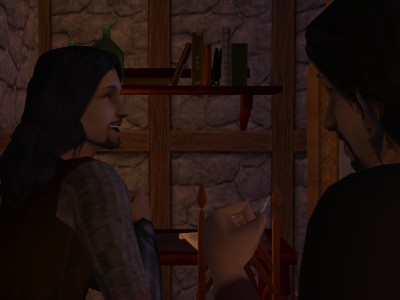





Perhaps this man is just what is needed to pull Sigegrith out of his funk. Maybe even get him to sober up and start acting like a king again. But what will he think when he first meets little Cobain and then meet Egelric?